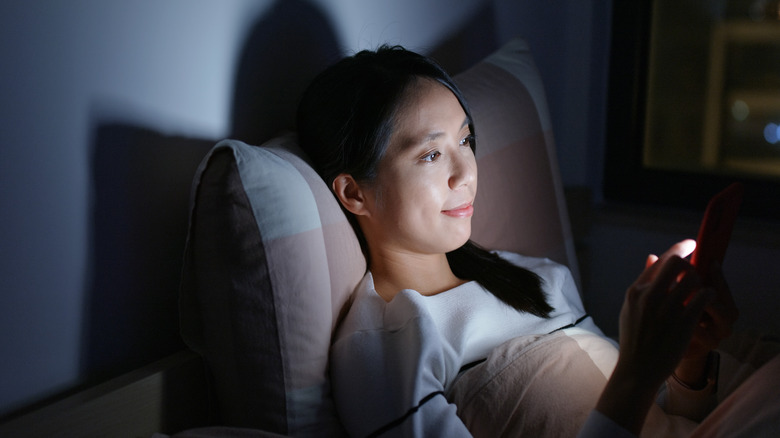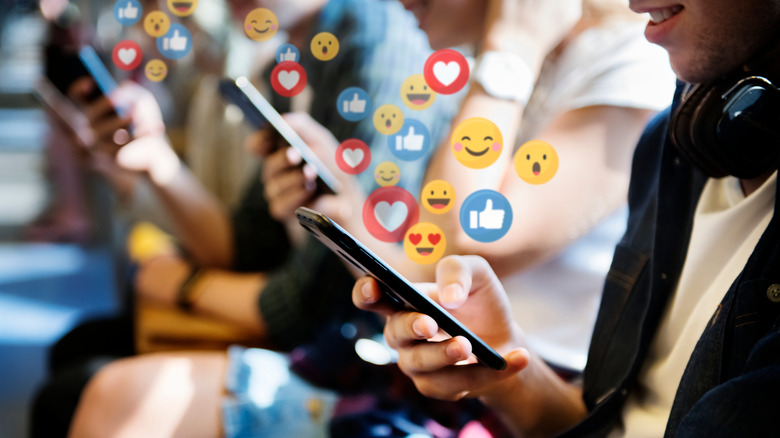What Do I Do If My Partner Spends Too Much Time On Facebook?
It's 3 a.m. You wake up suddenly and instead of seeing nothing but inky darkness in front of you, the room is dimly lit by the glow of a smartphone, as your partner quickly checks social media before going back to sleep.
Whether you like it or not, the Internet, smartphones, and social media have become the other party in a relationship between two married or committed adults. In a Pew Research study from 2014, 66 percent of adults use technology... a few even admitted to having had "hurtful experiences" triggered by tech use. That was then. As of 2019, the average smartphone owner unlocks their phone 150 times a day, 71 percent usually sleep with or next to their phone, and 75 percent of Americans use their phones in the toilet. But wait, there's more: 84 percent of working adults in the U.S. use their personal phones during working hours; 75 percent of workers in the UK admit to doing the same (via TechJury). So if your partner is one of those folks, welcome to the club. There are plenty of you out there.
Blame FOMO for heavy Facebook use
Blame FOMO — or the fear of missing out — as one of the key reasons why people spend crazy amounts of time on social media platforms like Facebook, Snapchat, and Instagram. Digital ethicist Tristan Harris describes Facebook as a FOMO trigger, saying, "If I convince you that I'm a channel for important information, messages, friendships, or potential sexual opportunities — it will be hard for you to turn me off, unsubscribe, or remove your account — because (aha I win) you might miss something important" (via Optimistic Learner).
Trouble is, being connected nearly 24/7 doesn't make anyone happy. In his book Digital Minimalism, Cal Newport thinks heavy use of social media can have negative effects. "The constant exposure to their friends' carefully curated portrayals of their lives generates feeling of inadequacy-especially during periods when they're already feeling low-and for teenagers, it provides a cruelly effective way to be publicly excluded," he said.
So what do you do if your partner just can't quit social media?
Surprisingly (or maybe not), one answer comes from Nir Eyal, the man The New York Times credits (blames?) for writing Hooked: How to Build Habit-Forming Products. Eyal is also the man behind the Hook Model — a four-step plan developers use to grab and keep people's attention through the use of rewards and pleasures that come at unpredictable times. Tech giants like 500 Startups' Dave McClure calls the book "an essential crib sheet for any start-up looking to understand user psychology."
Since he wrote Hooked, Eyal has become something of an anti-tech advocate, and he's got a few ideas on how heavy tech users (he doesn't call them tech addicts) can detox, all of which you can pass along to your partner. He recommends heavy users keep their phones on silent so there are fewer external triggers, emailing less, not hanging out on Slack, and exposing themselves to social pressure, like sitting next to someone who can see their screen.
But, after all these gentle recommendations, if your partner is still disinclined to dump his or her virtual life to get a real one, don't close your eyes to the possibility that there could be more than just FOMO or last-minute work negotiations going on — your partner could either be on the cusp of or having an affair. Jordan Gray, a sex and dating coach, admitted to The New York Times that social media and tech use, particularly within a relationship, is tricky "because it is completely uncharged territory. Social media accounts have never had this level of market saturation at any other point in human history. That's inevitably going to bring up some new challenges for people."
No matter the reason, communication is key. You'll want to discuss (in a nonjudgmental way) why your partner's heavy Facebook use makes you uncomfortable, and come to a consensus on ground rules that you can both live with (via Times of India).


